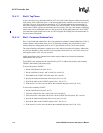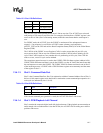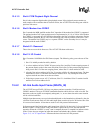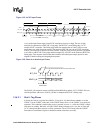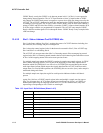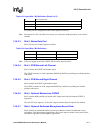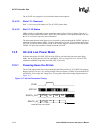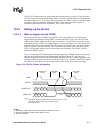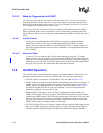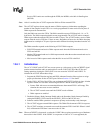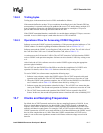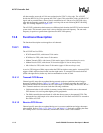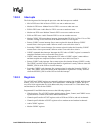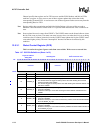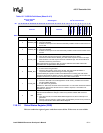
13-14 Intel® PXA255 Processor Developer’s Manual
AC’97 Controller Unit
13.5.2.2 Wake Up Triggered by the ACUNIT
AC-link protocol provides for a cold AC’97 reset and a warm AC’97 reset. The current power-
down state ultimately dictates which AC’97 reset is used. Registers must stay in the same state
during all power-down modes unless a cold AC’97 reset is performed. In a cold AC’97 reset, the
AC’97 registers are initialized to their default values.
After a power down, the AC-link must wait for a minimum of four audio frame times after the
frame in which the power down occurred before it can be reactivated by reasserting the SYNC
signal. When AC-link powers up, it indicates readiness through the CODEC ready bit (input slot 0,
bit 15).
13.5.2.2.1 Cold AC’97 Reset
A cold reset is generated when the nACRESET pin is asserted by software setting the
COLD_RST bit of the GCR to zero. Asserting and deasserting nACRESET activates
SDATA_OUT and causes the CODEC to activate BITCLK. All AC’97 control registers are
initialized to their default power-on reset values. nACRESET is an asynchronous input to the
AC’97 CODEC.
13.5.2.2.2 Warm AC’97 Reset
A warm AC’97 reset reactivates the AC-link without altering the current AC’97 register
values. A warm reset is generated by software setting the WARM_RST bit of the GCR to one.
When BITCLK is absent, generation of a warm reset results in SYNC being driven high for a
minimum of one microsecond. The CODEC must not activate BITCLK until it samples SYNC
low again. This prevents a new audio frame from being falsely detected.
13.6 ACUNIT Operation
The ACUNIT can be accessed through the processor or the DMA controller. The processor uses
programmed I/O instructions to access the ACUNIT, and it can access four register types:
• ACUNIT registers: Accessible at 32-bit boundaries. They are listed in Section 13.8.3.
• CODEC registers: An audio or modem CODEC can contain up to sixty-four 16-bit registers. A
CODEC uses a 16-bit address boundary for registers. The ACUNIT supplies access to the
CODEC registers by mapping them to its 32-bit address domain boundary. Section 13.8.3.17
describes the mapping from the 32-bit to 16-bit boundary. A write or read operation that
targets these registers is sent across the AC-link.
• Modem CODEC GPIO register: If the ACUNIT is connected to a modem CODEC, the
CODEC GPIO register can also be accessed. The CODEC GPIO register uses access address
0x0054 in the CODEC domain. The GPIO write operation goes across the AC-link, but a read
does not. The GPIO register contents are continuously updated into a shadow register in the
ACUNIT when a frame is received from the CODEC. When the processor tries to read the
CODEC GPIO register, this shadow register is read instead.
• ACUNIT FIFO data: The ACUNIT has two Transmit FIFOs for audio-out and modem-out and
three receive FIFOs for audio-in, modem-in, and mic-in. Data enters the transmit FIFOs by
writing to either the PCM Data Register (PCDR) or the Modem Data Register (MODR).



